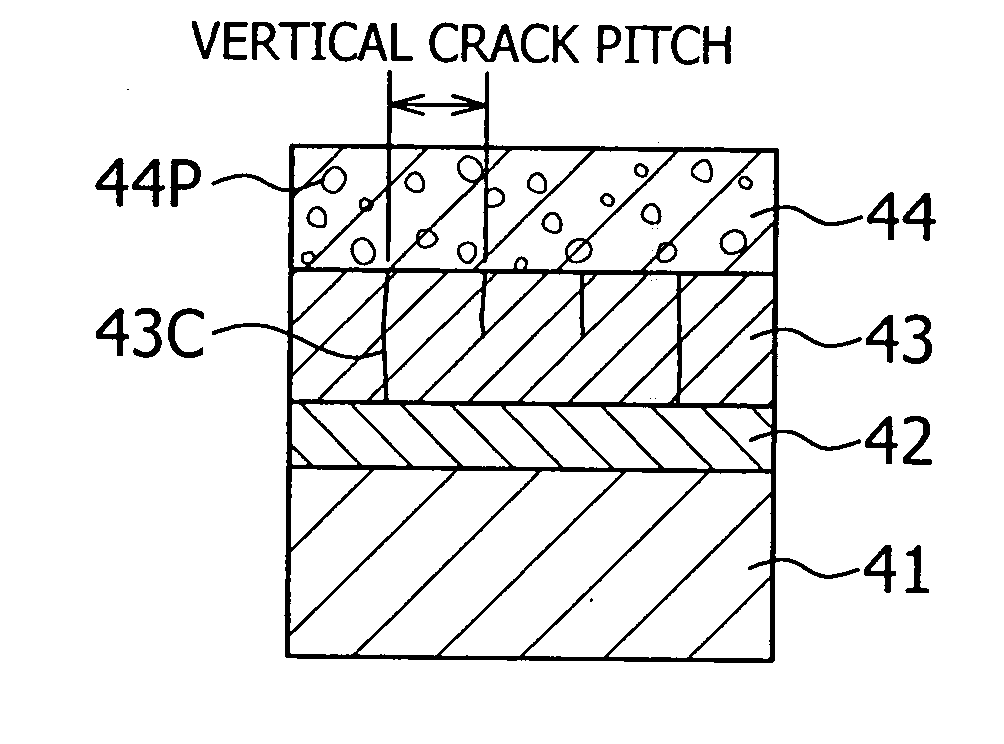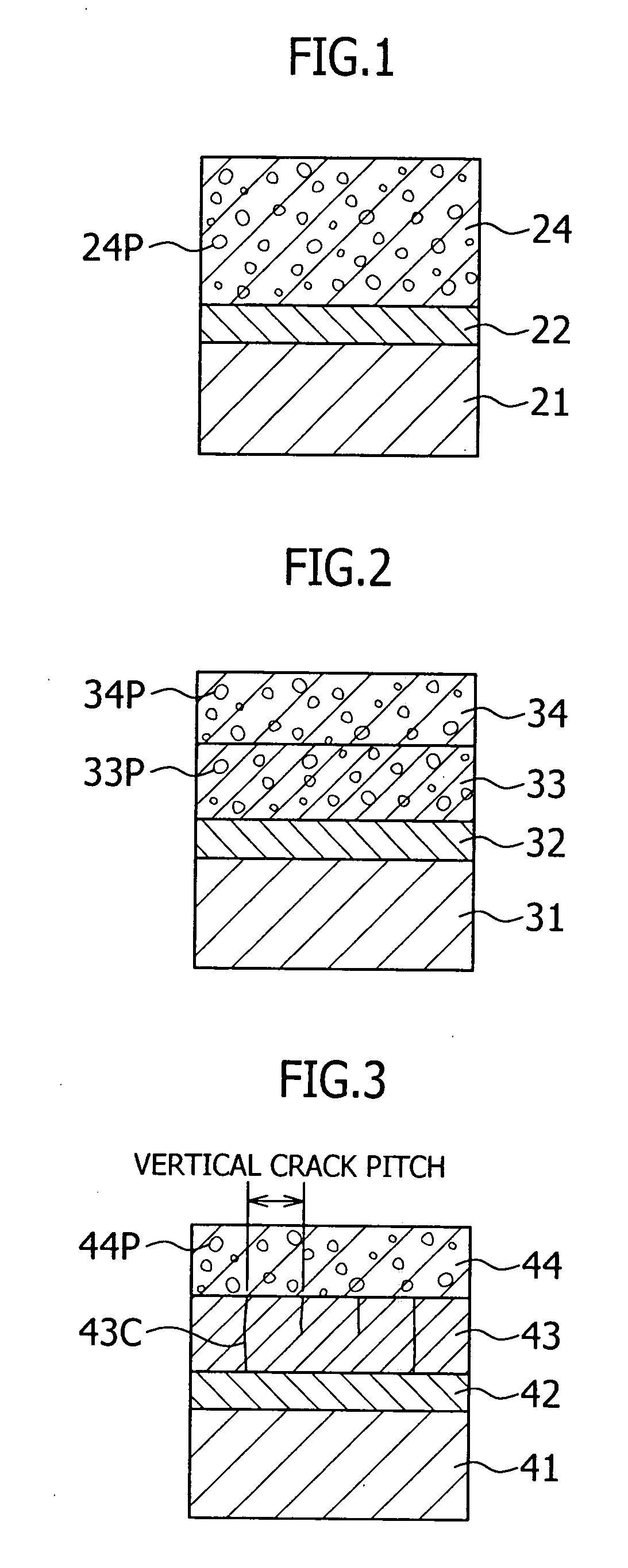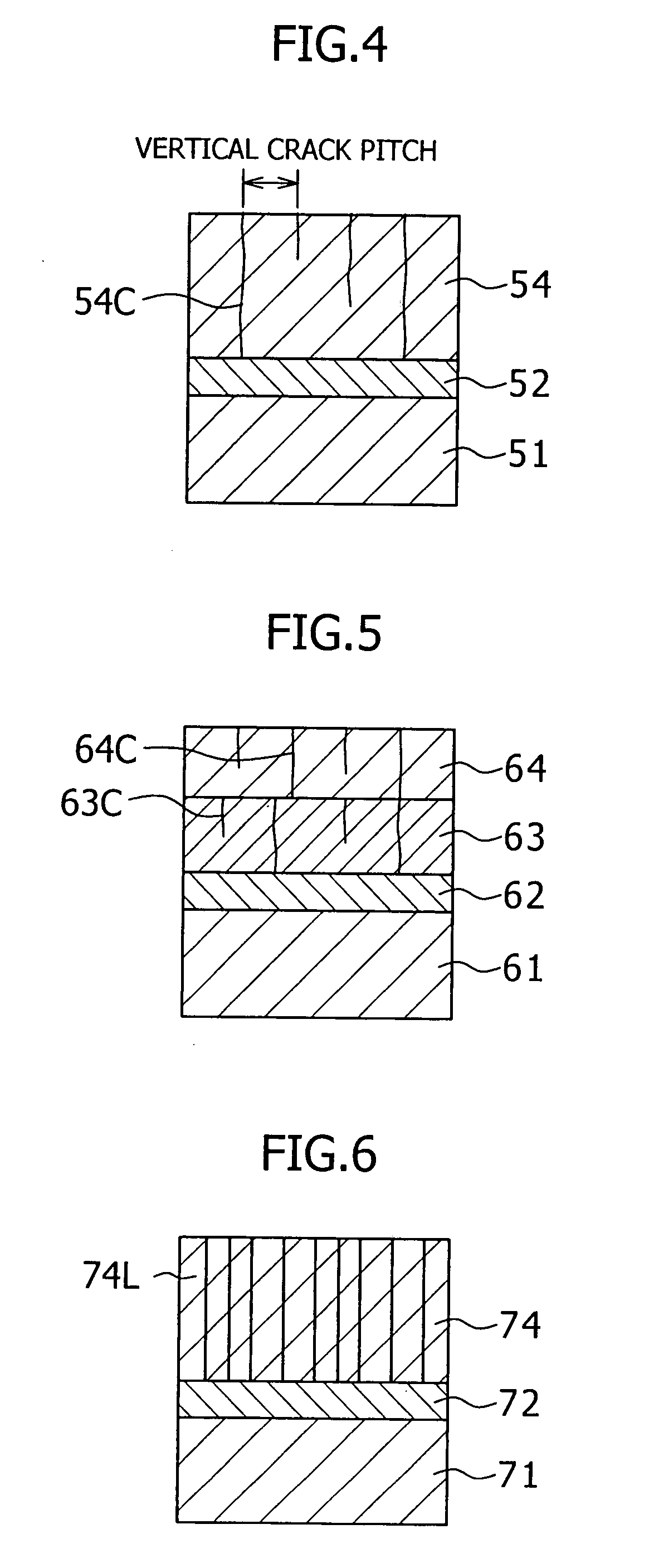Thermal barrier coating material, thermal barrier member, and member coated with thermal barrier and method for manufacturing the same
- Summary
- Abstract
- Description
- Claims
- Application Information
AI Technical Summary
Benefits of technology
Problems solved by technology
Method used
Image
Examples
examples 1 and 2
[0114]In order to examine the thermal conductivity in a bulk body, a sintered body of Sm2Zr2O7, Gd2Zr2O7 or Dy2Zr2O7 among A2Zr2O7 was produced using Sm2O3 powder, Gd2O3 powder or Dy2O3 powder (Sm2O3 powder, Gd2O3 powder or Dy2O3 powder in fine powder 3C Series manufactured by Nippon Yttrium Co., Ltd.) together with ZrO2 powder (ZrO2 in fine powder TZ-0 manufactured by Nippon Yttrium Co., Ltd.) as materials in a ordinary-pressure sintering method under the conditions of a sintering temperature of 1600° C. and a sintering time of 5 hours. Thereafter, the sintered body was cut into samples of a thickness of about 1 mm, and the thermal conductivity of the sintered body was measured using a laser flash method specified in Japanese Industrial Standards (JIS) R1611. The results are shown in FIG. 10.
examples 3 and 4
[0116]Samples were prepared and the thermal cycle life was measured. As a heat-resistant substrate, an Ni-based heat-resistant alloy was used. The composition of alloy was 16 wt % Cr, 8.5 wt % Co, 1.75 wt % Mo, 2.6 wt % W, 1.75 wt % Ta, 0.9 wt % Nb, 3.4 wt % Ti, 3.4 wt % Al and the balance being Ni. The heat-resistant substrate was in form of a disc having a thickness of 5 mm and a diameter of 30 mm.
[0117]The surface of the heat-resistant substrate was subjected to grid blasting using Al2O3 particles, and a bond coat layer of a Co—Ni—Cr—Al—Y alloy having a composition of 32 wt % Ni, 21 wt % Cr, 8 wt % Al, 0.5 wt % Y and the balance being Co with a thickness of 0.1 mm was formed using a low-pressure plasma spray coating method.
[0118]On the Co—Ni—Cr—Al—Y bond coat layer, a Sm2Zr2O7 or Gd2Zr2O7 layer having a thickness of 0.5 mm was formed using an atmospheric pressure plasma spray coating method so as to have a porous structure of a porosity of 10%. In the atmospheric pressure plasma ...
examples 5 and 6
[0120]The same steps as in Examples 3 and 4 were carried out up to the formation of the bond coat layer. Thereafter, using YSZ spray coating powder (204NS-G manufactured by Sulzer Metco (Japan) Ltd. having a compounding ratio of 8% by weight of yttria and 92% by weight of zirconia), a porous YSZ layer of a thickness of 0.25 mm having a porosity of 10% was formed. The porous YSZ layer was formed by atmospheric pressure plasma spray coating using a spray gun (F4 gun) manufactured by Sulzer Metco (Japan) Ltd. and YSZ spray coating powder under the conditions of a spray coating current of 600 A, a spray coating distance of 150 mm, a powder supply of 60 g / min, and Ar / H2 of 35 / 7.4 L / min.
[0121]Subsequently, a porous layer of Sm2Zr2O7 (synthesized by a powder mixing method using Sm2O3 in fine powder 3C Series manufactured by Nippon Yttrium Co., Ltd., and ZrO2 in fine powder TZ-0 manufactured by Nippon Yttrium Co., Ltd.) or Gd2Zr2O7 (synthesized by a powder mixing method using Gd2O3 in fine ...
PUM
| Property | Measurement | Unit |
|---|---|---|
| Thickness | aaaaa | aaaaa |
| Electrical resistance | aaaaa | aaaaa |
Abstract
Description
Claims
Application Information
 Login to View More
Login to View More - R&D
- Intellectual Property
- Life Sciences
- Materials
- Tech Scout
- Unparalleled Data Quality
- Higher Quality Content
- 60% Fewer Hallucinations
Browse by: Latest US Patents, China's latest patents, Technical Efficacy Thesaurus, Application Domain, Technology Topic, Popular Technical Reports.
© 2025 PatSnap. All rights reserved.Legal|Privacy policy|Modern Slavery Act Transparency Statement|Sitemap|About US| Contact US: help@patsnap.com



